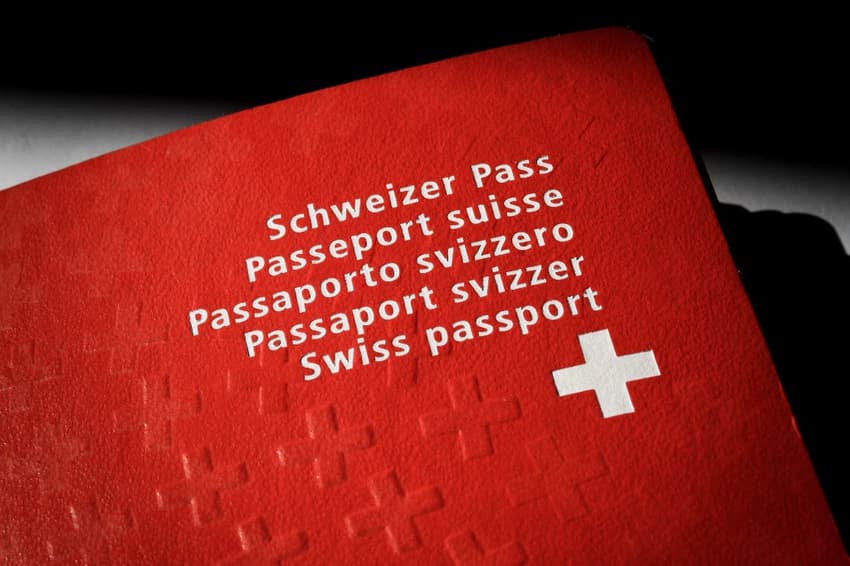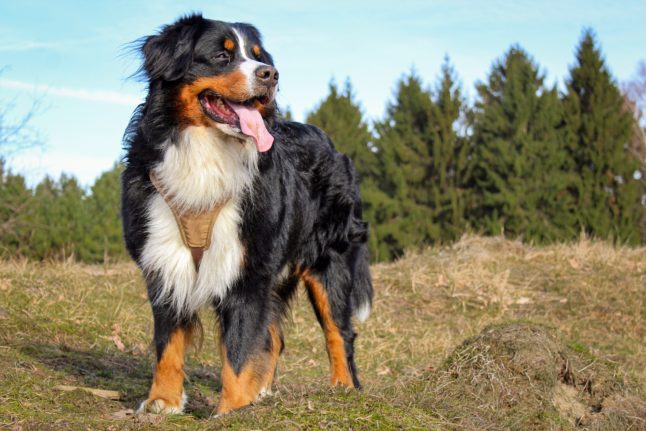OPINION: 'Eidgenosse' and what does it really mean to be Swiss?

Whoever is in the possession of a Swiss passport is considered to be Swiss. But as Serbian-born, Swiss national Sandra Sparrowhawk explains, things are not always quite so simple in reality.
It was a mild spring day in the quaint town of Reiden and I was sat in the garden of a fellow student’s lush family home surrounded by around one third of my class.
All born to Swiss parents. All, but me. At the time, we were in the last leg of our apprenticeship and everyone mutually decided to kick off our imminent graduation and the much anticipated start to our adult lives with a celebratory barbecue. Everything was going smoothly. The sun was out, the food was being prepped, the conversation was flowing, jokes were being made. But it is as they say, all good things must come to an end.
Now in my time being Swiss, I’ve been all too aware of this sobering reality. I had learned it the hard way through the years and this day was no different. As I looked down to devour the last of my Bratwurst, I heard it clearly - "Jugo". A disparaging term widely used in Switzerland to describe citizens of former Yugoslavia. My classmates turned friends had - unbeknown to them - made a joke at my expense. Laughter soon erupted. I remember looking up with an awkward half-smirk only to be met with confusion as the last of the giggles died down. The host turned to me and asked: “What's the matter with you”?
The matter with me, as it turns out, is not so easily explained. Not even 15 years following the event, nor 32 years into being Swiss. Back then, a veil had been lifted and behind it was me. Uncomfortable, deeply conflicted, Serbian me.
But my story isn’t unique to me. It is one that is shared by many Swiss citizens with a migration background.
'Anyone can be Swiss'
It was the year 2010 when Aarberg-born wrestler Christian Stucki declared: “Anyone can become Swiss, but not anyone can become Eidgenosse”. The latter term is occasionally used to refer to native Swiss citizens, as opposed to those having obtained citizenship via the second-rate passport route. Stucki’s daring declaration rightfully earned him some heat back in 2010 and his manager was quick to retaliate. But the question remains, when is one truly considered Swiss, and is there some truth in Stucki’s statement?

What does it mean to be Swiss? Photo by Valeriano de Domenico/AFP
This debate enjoyed a brief stint on the political stage. In 2012, a parliamentarian from Switzerland’s largest political party, SVP Schweiz, demanded that the Zurich authorities divide Swiss citizens into two groups: naturalised and those Swiss since birth. The purpose behind this proposal was to enable Swiss authorities to highlight key differences, such as a higher crime rate or a disproportionate receipt of social assistance in naturalised citizens, and hence offer aid where needed. Or so was the claim.
Despite the change never seeing the light of day, the divisive terminology largely used to differentiate between native and non-native Swiss citizens persists and can, for many Swiss with a migration background, be a hard pill to swallow.
What’s in a word?
The term Eidgenosse means different things to different people and is by no means accompanied by a negative connotation at all times. To some Swiss, it simply serves as a reference for outstanding Swiss wrestlers. To others, it describes nothing more than a down-to-earth Swiss citizen - of any background. Still others associate the term with an old army bicycle, or even a local pub. Yet, perhaps unsurprisingly, the use of the term Eidgenosse is particularly favoured in extreme right-wing and nationalistic circles and hence runs the risk of reinforcing an already-existing distinction between the “true Swiss” and everyone else.
Today, the distinction is often used in certain circles and in rural Switzerland, where a few select people have taken it upon themselves to divide Swiss citizens even further.
More specifically, they have introduced an unofficial three-level division, which differentiates not only between native and non-native Swiss, but divides citizens into three categories: Secondos (naturalised Swiss), Swiss (naturalised for at least two generations and fluent in a Swiss dialect), and lastly, Eidgenossen (Swiss citizens on Swiss soil since the beginning of their family chronicle). The latter is nearly impossible to prove.
Meanwhile, linguistics suggest that a term such as Eidgenosse, meant to differentiate between people, is usually born whenever a need for such a differentiation arises, be it increased crime rates, concealment of mass immigration or wage dumping. However, it is commonly understood that these divisive terms should never become a fixed part of common usage.

A 'typically Swiss' dog breed: the Bernese mountain dog. (Photo by Alexandra Lau on Unsplash)
Whenever I hear the word Eidgenosse, I think of the year 1291, when, according to legend, the three confederates of Central Switzerland - Uri, Schwyz and Nidwalden - founded the Schweizerische Eidgenossenschaft with the Rütli oath. Those three gentleman and their kinsmen and women born before 1798, when Napoleon destroyed the Old Confederation, are the sole claimants to the title Eidgenosse. Everyone else should be judged on a case by case basis - preferably with DNA papers to hand.
As for me, I consider myself as Swiss as they come. I was born in Switzerland, grew up here, my closest friends are Swiss, I speak German and French without so much as a hint of an accent, I am most at home speaking in Aargauerdüütsch, enjoyed my education here, work here, take part in Swiss traditions and celebrations, and fulfil all other civic duties expected of a Swiss citizen. I even adopted two Bernese Mountain Dogs for good measure. Yet, whenever my maiden name comes up in conversation - Micić - I am treated as an outsider. Non-Swiss. It is a reality I’ve come to live with, though I shouldn’t have to.
To return to my question from before, when is one considered truly Swiss? Well, to keep it simple: when one feels Swiss and that is entirely up to you.
Comments
See Also
It was a mild spring day in the quaint town of Reiden and I was sat in the garden of a fellow student’s lush family home surrounded by around one third of my class.
All born to Swiss parents. All, but me. At the time, we were in the last leg of our apprenticeship and everyone mutually decided to kick off our imminent graduation and the much anticipated start to our adult lives with a celebratory barbecue. Everything was going smoothly. The sun was out, the food was being prepped, the conversation was flowing, jokes were being made. But it is as they say, all good things must come to an end.
Now in my time being Swiss, I’ve been all too aware of this sobering reality. I had learned it the hard way through the years and this day was no different. As I looked down to devour the last of my Bratwurst, I heard it clearly - "Jugo". A disparaging term widely used in Switzerland to describe citizens of former Yugoslavia. My classmates turned friends had - unbeknown to them - made a joke at my expense. Laughter soon erupted. I remember looking up with an awkward half-smirk only to be met with confusion as the last of the giggles died down. The host turned to me and asked: “What's the matter with you”?
The matter with me, as it turns out, is not so easily explained. Not even 15 years following the event, nor 32 years into being Swiss. Back then, a veil had been lifted and behind it was me. Uncomfortable, deeply conflicted, Serbian me.
But my story isn’t unique to me. It is one that is shared by many Swiss citizens with a migration background.
'Anyone can be Swiss'
It was the year 2010 when Aarberg-born wrestler Christian Stucki declared: “Anyone can become Swiss, but not anyone can become Eidgenosse”. The latter term is occasionally used to refer to native Swiss citizens, as opposed to those having obtained citizenship via the second-rate passport route. Stucki’s daring declaration rightfully earned him some heat back in 2010 and his manager was quick to retaliate. But the question remains, when is one truly considered Swiss, and is there some truth in Stucki’s statement?

This debate enjoyed a brief stint on the political stage. In 2012, a parliamentarian from Switzerland’s largest political party, SVP Schweiz, demanded that the Zurich authorities divide Swiss citizens into two groups: naturalised and those Swiss since birth. The purpose behind this proposal was to enable Swiss authorities to highlight key differences, such as a higher crime rate or a disproportionate receipt of social assistance in naturalised citizens, and hence offer aid where needed. Or so was the claim.
Despite the change never seeing the light of day, the divisive terminology largely used to differentiate between native and non-native Swiss citizens persists and can, for many Swiss with a migration background, be a hard pill to swallow.
What’s in a word?
The term Eidgenosse means different things to different people and is by no means accompanied by a negative connotation at all times. To some Swiss, it simply serves as a reference for outstanding Swiss wrestlers. To others, it describes nothing more than a down-to-earth Swiss citizen - of any background. Still others associate the term with an old army bicycle, or even a local pub. Yet, perhaps unsurprisingly, the use of the term Eidgenosse is particularly favoured in extreme right-wing and nationalistic circles and hence runs the risk of reinforcing an already-existing distinction between the “true Swiss” and everyone else.
Today, the distinction is often used in certain circles and in rural Switzerland, where a few select people have taken it upon themselves to divide Swiss citizens even further.
More specifically, they have introduced an unofficial three-level division, which differentiates not only between native and non-native Swiss, but divides citizens into three categories: Secondos (naturalised Swiss), Swiss (naturalised for at least two generations and fluent in a Swiss dialect), and lastly, Eidgenossen (Swiss citizens on Swiss soil since the beginning of their family chronicle). The latter is nearly impossible to prove.
Meanwhile, linguistics suggest that a term such as Eidgenosse, meant to differentiate between people, is usually born whenever a need for such a differentiation arises, be it increased crime rates, concealment of mass immigration or wage dumping. However, it is commonly understood that these divisive terms should never become a fixed part of common usage.

Whenever I hear the word Eidgenosse, I think of the year 1291, when, according to legend, the three confederates of Central Switzerland - Uri, Schwyz and Nidwalden - founded the Schweizerische Eidgenossenschaft with the Rütli oath. Those three gentleman and their kinsmen and women born before 1798, when Napoleon destroyed the Old Confederation, are the sole claimants to the title Eidgenosse. Everyone else should be judged on a case by case basis - preferably with DNA papers to hand.
As for me, I consider myself as Swiss as they come. I was born in Switzerland, grew up here, my closest friends are Swiss, I speak German and French without so much as a hint of an accent, I am most at home speaking in Aargauerdüütsch, enjoyed my education here, work here, take part in Swiss traditions and celebrations, and fulfil all other civic duties expected of a Swiss citizen. I even adopted two Bernese Mountain Dogs for good measure. Yet, whenever my maiden name comes up in conversation - Micić - I am treated as an outsider. Non-Swiss. It is a reality I’ve come to live with, though I shouldn’t have to.
To return to my question from before, when is one considered truly Swiss? Well, to keep it simple: when one feels Swiss and that is entirely up to you.
Join the conversation in our comments section below. Share your own views and experience and if you have a question or suggestion for our journalists then email us at [email protected].
Please keep comments civil, constructive and on topic – and make sure to read our terms of use before getting involved.
Please log in here to leave a comment.